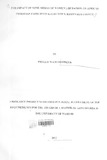| dc.description.abstract | The study involves an examination of the impact of some modes of women liberation to the African Christian families in Kagio town, Kirinyaga County. Four objectives were addressed in order to successfully conduct the study. First an understanding of the African Christian family is examined. Second diverse types of women liberation and those common in Kagio Town are discussed. Then the emerging features in the African Christian family in view of the nature of gender relations triggered by diverse modes of women liberation are explicated. This is followed by drawing out some insights from the study in view of promoting more authentic gender relations.
The conceptual perception of the research problem and the methodology are informed by three theories, namely: The mediation theory as propagated by Leonardo Boff and Clodovis Boff; Theory of Different Perception of Feminism resulting in Diverse Modes of Feminism by P. N. Wachege; and the theory of Remythologizaton and reconstruction by J. N. K. Mugambi. The mediation theory guides the method used in conducting the study- first the researcher mingled with the people in the area of study and got to learn first-hand information on the issue being researched, then a critical analysis of the assembled data is done, followed by a hermeneutic analysis, which is concerned with relating insights draw from the study to the Christian doctrines and finally coming up with practical suggestions on the way forward, in regards to the research problem. The respondents were selected through purposive random sampling.
The major findings of the study are that women liberation had impacted on the family, both positively and negatively. Through the empowerment of the women, family life has been made better, through easier and better access to basic amenities. Contrary, marriage relationships have been challenged leading to family breakdown and consequential implications to the children and the society. Some of the challenges are such as; divorce, separation, domestic violence, infidelity, suicide, suicide murder of spouses and poor parenting. Some of the underlying causative factors to these challenges, which are attributed to women liberation include; culture shock, rivalry,
It was suggested that pre-marital counselling be emphasized and the content and form reexamined. Marital counselling should also be emphasized and made readily 'available to people, irrespective of the backgrounds or orientations. Deeper and relevant catechism on issues confronting the family should be done, in view of the contemporary society. Church liturgy should be family centred, to help aid in spiritual growth and maturity of individuals, the family and the Church.
Pastoral care, to victims of marital problems should be free of assumptions, stereotypes or unfounded proposition of the nature of the problems in the African Christian family. Parental schools for parents and house helps should be established. Parenting friendly policies such virtual office, should be adopted at the work places. Enlisting of male counterpart in the otherwise women only liberation initiative should be considered. Inter-cultural, ecumenical and interfaith approaches could be adopted in designing and implementing possible solutions to the African Christian family. | en_US |

